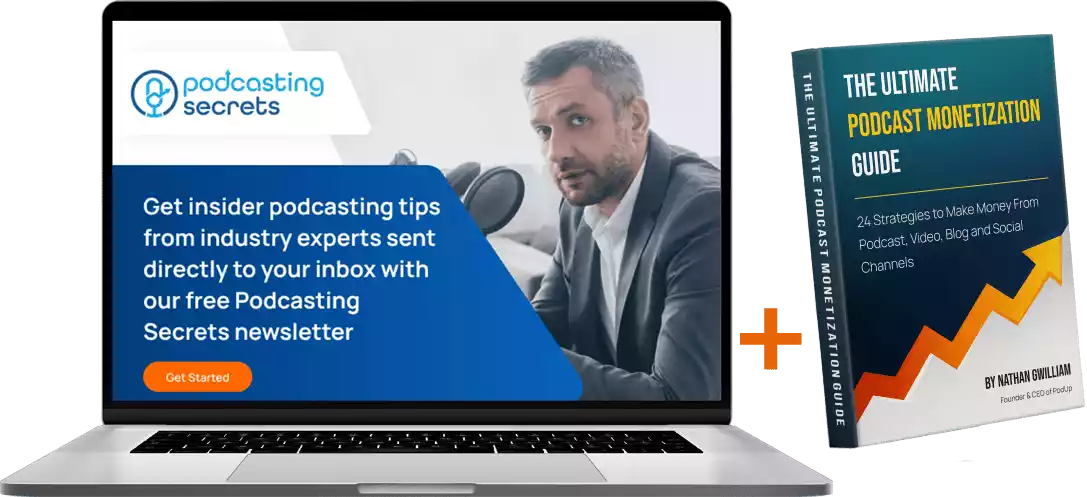
7 Strategies for Leveraging Your Podcast into Paid Speaking Engagements
Podcasting has emerged as a powerful platform for sharing ideas, building audiences, and establishing expertise. But what if you could take your podcasting success to the next level and transform it into lucrative speaking engagements? That's exactly what Jonathan Jones, a bestselling author, two-time TEDx speaker, and host of the Your Podcast Mentor Show, has achieved.
In this week’s episode of the Podcasting Secrets Bonus series, Jonathan shared his insights on how podcasters can leverage their expertise to become sought-after paid speakers. With years of experience in both podcasting and professional speaking, Jonathan offers a unique perspective on bridging these two worlds.
This blog post will explore seven key strategies that podcasters can use to transition into the world of paid speaking engagements. Whether you're just starting your podcasting journey or you're a seasoned pro looking to expand your reach, these tips will help you unlock new opportunities and monetize your expertise in exciting ways.
1. Position Yourself as an Authority
The first step in leveraging your podcast for speaking engagements is to establish yourself as an authority in your niche. This begins with the very name of your podcast and extends to every piece of content you create.
Choose a podcast name that clearly communicates your expertise and the value you bring to your audience. For example, Jonathan titled his show "Your Podcast Mentor Show with Jonathan Jones," immediately positioning himself as an expert guide in the podcasting space. This clear positioning helps potential clients and event organizers understand your unique value proposition.
Once you've established your brand, focus on creating content that reinforces your authority. Address common challenges in your industry and provide actionable solutions in each episode. By consistently delivering valuable insights, you'll build a reputation as a go-to expert in your field. This reputation will make you more attractive to event organizers looking for knowledgeable speakers who can provide real value to their audiences.
2. Build a Body of Work
To be considered for speaking engagements, you need to demonstrate a track record of expertise and consistency. This is where your podcast becomes an invaluable asset.
Aim to produce a substantial number of episodes that showcase your knowledge and skills. As you build your podcast library, you're simultaneously creating a portfolio of your expertise. Event organizers can easily browse through your episodes to get a sense of your speaking style, depth of knowledge, and ability to engage an audience.
Consider creating themed series or seasons that focus on specific topics within your niche. This approach allows you to dive deep into subjects, further establishing your credibility. Additionally, it provides potential clients with a clear understanding of the topics you can speak about at their events. Remember, the more comprehensive and diverse your body of work, the more appealing you'll be as a potential speaker.
3. Nurture Relationships with Decision Makers
While having a great podcast is essential, building relationships with event organizers and decision-makers is equally crucial for securing speaking engagements.
One effective strategy is to invite potential clients as guests on your podcast. This approach serves multiple purposes:
- It allows you to showcase your interviewing skills
- It helps you build a personal connection with the decision-maker
- It provides value to your audience by featuring industry leaders
- It gives you an opportunity to learn more about the events and opportunities in your field
When inviting guests, focus on individuals who align with your content and have the power to book speakers for events. During these interviews, you can subtly demonstrate your expertise and passion for speaking. After the interview, maintain the relationship by staying in touch and expressing interest in their upcoming events.
4. Develop a Strong Personal Brand
In the competitive world of professional speaking, a strong personal brand can set you apart and make you more memorable to potential clients.
Key elements of a strong personal brand include:
- Consistent visual identity (colors, fonts, logos)
- Clear messaging about your expertise and value proposition
- A professional website showcasing your podcast and speaking topics
- Active presence on relevant social media platforms
- High-quality promotional materials (speaker reel, headshots, bio)
Your podcast can play a crucial role in reinforcing your personal brand. Use your brand elements consistently across your podcast artwork, website, and social media profiles. Ensure that the topics you discuss and the way you present yourself on your podcast align with the speaking topics and style you want to be known for.
As your brand grows stronger, consider investing in professional videography for your podcast. High-quality video clips from your podcast can serve as excellent promotional material for your speaking career, giving potential clients a clear preview of your on-stage presence and style.
5. Create Valuable Complementary Products
While speaking fees are an important source of income, successful speakers often maximize their earnings through additional revenue streams. Your podcast provides an excellent foundation for creating and promoting these complementary products.
Consider developing products such as:
- Books or e-books based on your podcast content
- Online courses expanding on topics from your show
- Coaching or consulting services
- Branded merchandise
- Membership sites or premium podcast content
These products not only provide additional income but also enhance your credibility as a speaker. For example, being able to introduce yourself as a "bestselling author" or "creator of a popular online course" can significantly boost your appeal to event organizers.
Use your podcast to promote these products and create interest in your broader offerings. This approach allows you to demonstrate the depth of your expertise and provides multiple ways for your audience to engage with your content, increasing the likelihood that event organizers will see you as a valuable addition to their lineup.
6. Master the Art of Storytelling
Effective storytelling is a crucial skill for both podcasting and public speaking. By honing this skill on your podcast, you'll be better prepared to deliver engaging and memorable presentations on stage.
Focus on crafting compelling narratives that illustrate your key points. Practice weaving personal anecdotes, case studies, and relatable scenarios into your podcast episodes. This not only makes your content more engaging for listeners but also demonstrates to potential clients your ability to connect with an audience.
Remember that different audiences may require different storytelling approaches. Use your podcast to experiment with various storytelling techniques and styles. This practice will make you more versatile as a speaker, able to adapt your presentations to suit different events and audience demographics.
7. Leverage Your Audience for Speaking Opportunities
Your podcast audience can be a valuable asset in your journey to becoming a paid speaker. They're not just listeners; they're potential advocates who can help you secure speaking engagements.
Encourage your listeners to spread the word about your podcast and expertise. You might be surprised to find that some of your listeners are in positions to book speakers or can recommend you to event organizers in their networks. Regularly remind your audience that you're available for speaking engagements and provide clear information on how to book you.
Consider creating a dedicated section on your website for speaking inquiries, listing your areas of expertise and the types of events you're interested in. You can promote this page on your podcast, encouraging listeners to share it with relevant contacts.
Additionally, use your podcast to share stories and insights from your speaking engagements. This not only provides interesting content for your listeners but also reinforces your credibility as a speaker and may inspire others to book you for their events.
From Mic to Stage: Launching Your Speaking Career
Transitioning from podcaster to paid speaker is an exciting journey that can open up new opportunities for growth, influence, and income. By implementing these seven strategies – positioning yourself as an authority, building a substantial body of work, nurturing relationships with decision-makers, developing a strong personal brand, creating valuable complementary products, mastering storytelling, and leveraging your audience – you can effectively bridge the gap between podcasting and professional speaking.
Remember, the key is to view your podcast not just as a standalone platform but as a powerful tool for showcasing your expertise, building relationships, and creating opportunities. Each episode you produce is a chance to refine your message, engage with potential clients, and demonstrate your value as a speaker.
As you embark on this journey, take some time to reflect on your unique strengths and experiences. What stories from your podcast resonate most with your audience? Which topics generate the most engagement? How can you translate the skills you've developed as a podcaster into compelling stage presentations?
By thoughtfully applying these strategies and continually refining your approach, you can transform your podcasting success into a thriving speaking career. So, take that first step today – whether it's refining your podcast's positioning, reaching out to a potential client for an interview, or creating your first complementary product. The world of paid speaking engagements awaits, and your podcast has already given you a head start. It's time to take the stage!
Key Takeaways:
1. Podcasters can leverage their expertise to generate revenue through paid speaking engagements, which can offset production costs and potentially provide additional income.
2. Event coordinators seek podcasters as speakers because they have a track record of covering niche topics and can demonstrate their credibility through existing content.
3. To establish yourself as a sought-after paid speaker, position yourself as an authority in your niche, consistently produce valuable content, and cultivate relationships with potential clients.
4. To gain initial speaking experience, seek out local opportunities or create your own speaking content to showcase your skills.
5. Personal branding is crucial for speakers; consider elements like brand colors, fonts, and emotions you want to evoke in your audience.
6. When negotiating speaking fees, start with a higher price than your target to allow room for negotiation.
7. Speakers can maximize earnings by selling books, merchandise, courses, and other products in addition to their speaking fees.
8. Engaging in speaking involves understanding your audience's needs, using relatable stories, and incorporating interactive elements to create a memorable experience.
9. Common mistakes for paid speakers include not practicing enough, going over the allotted time, and failing to tailor content to the specific audience.
If you're looking for a great all-in-one podcasting platform with 35 integrated modules, you can get a free trial at PodUp.com.
Thank you very much for joining me for this episode, and I wish you success in leveraging your podcast into paid speaking engagements.




Comments